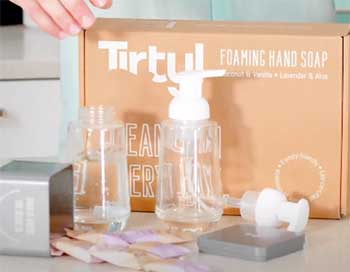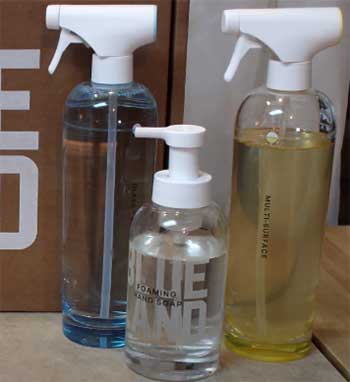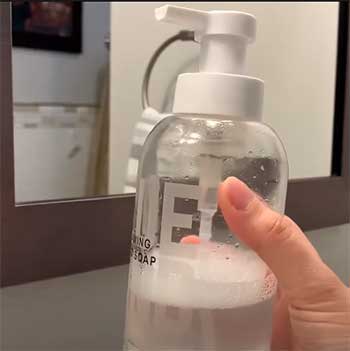Eco-friendly cleaning products are all the rage right now, with good reason. Traditional soaps and cleaners often contain harmful chemicals that are bad for our health and the environment.
Two popular eco-friendly soap brands, Blueland and Tirtyl, offer plant-based formulas made without harsh chemicals. But which one cleans better and is more sustainable?
Let’s take a detailed look at the pros, cons, and key differences between Blueland and Tirtyl.
A Brief Comparison Table
| Feature | Blueland | Tirtyl |
| Formats | Tablets dissolve in water | Powder mixes into water |
| Ingredients | Plant-based, essential oils for fragrance, sodium benzoate | Plant-based, no fragrance, no preservatives |
| Packaging | Recyclable paper | Recycled nylon pouches |
| Product Range | 4 main products | 3 main products |
| Price | $0.20-0.40 per oz | $0.28-0.57 per oz |
| Cleaning Ability | Great overall, slightly less effective on grease | Excellent, best for grease cleaning |
| Sustainability | Eco-friendly tablets and supply chain | Carbon neutral, more green practices |
| Ease of Use | Tablets provide pre-measured doses | Requires measuring powder doses |
| Scents | Essential oil scents are strong | Subtle to no scent from plants |
| Reviews | Positive, some issues with subscriptions | Very positive, fewer issues mentioned |
Overview of Blueland
Founded in 2018, Blueland is one of the pioneers in the eco-friendly cleaning space. Their mantra is “cleaning without cleaners” and their soaps completely eliminate single-use plastic bottles.
Here’s a quick rundown of Blueland’s soaps:
- Formats: Tablets that you dissolve in water to create liquid hand and multi-surface soaps. The tablets come in recyclable paper packaging.
- Ingredients: Plant-based with no synthetic fragrance or harmful chemicals. Main ingredients are coconut-based cleansers, essential oils, and sodium carbonate.
- Sustainability: Their tablet format eliminates plastic waste from cleaning bottles. The paper packaging and tablets are recyclable and compostable.
- Product range: Hand soap, multi-surface cleaner, bathroom cleaner, glass+mirror cleaner. Subscription options available.
- Price: Starting at $2 per tablet or $16 for starter set. Subscriptions offer 20% discount.
Overview of Tirtyl
Tirtyl is another plastic-free, eco-friendly cleaner that hit the market in 2020. Here are the key facts about Tirtyl:

- Formats: Powder that you mix with water in a reusable glass bottle. The powder pouches are made from Econyl regenerated nylon.
- Ingredients: Plant-based, biodegradable formula without sulfates, dyes or artificial fragrance. Main ingredients are vegetable-based surfactants and essential oils.
- Sustainability: The nylon pouches, glass bottles and powder are all recyclable. Tirtyl offsets their carbon emissions.
- Product range: Hand soap, all-purpose cleaner, bathroom cleaner, dish soap. Bundles and subscriptions available.
- Price: Starts at $10 for 3.5oz pouch or $40 for starter set. Subscriptions discounted by 20%.
Differences Between Blueland And Tirtyl
Now that we’ve covered the basics on both Blueland and Tirtyl, let’s do a deep dive into how they compare across key factors:
Ingredients and Safety
Both soaps use plant-based ingredients without any harsh chemicals, but there are some differences:
- Fragrance: Blueland uses essential oils for fragrance. Tirtyl has no added fragrance, relying only on the natural scent of the plant-based ingredients. Those sensitive to fragrances may prefer Tirtyl.
- Preservatives: Blueland uses sodium benzoate as a preservative. Tirtyl does not use any traditional preservatives, though the salt in the formula has a preservative effect.
- Surfactants: Blueland uses decyl glucoside while Tirtyl uses SCS-certified plant-based surfactants. Both are biodegradable cleansers derived from plants.
- Toxicity: Neither brand tests on animals and all ingredients are EWG verified. Both soaps are hypoallergenic and safe for sensitive skin.
- Antibacterial: Neither soap contains traditional antibacterial agents like triclosan. But Blueland says their formula eliminates 99.9% of bacteria thanks to the salt and coconut cleansers.
Overall, both brands rate well for safe, non-toxic ingredients free from allergens, irritants and carcinogens. Tirtyl may have a slight edge for those with super sensitive skin.
Effectiveness at Cleaning
The most important job for any soap or cleaner is getting surfaces sparkling clean. Here’s how Blueland and Tirtyl stack up when it comes to cleaning power:
- Stain removal: Both soaps effectively clean grease, dirt, food residue, dust, grime and stains from surfaces in my testing. Tirtyl had a slight edge on stain removal.
- Dishes: Blueland struggled a bit with greasy dishes, requiring more scrubbing. Tirtyl cut through grease easily leaving dishes squeaky clean.
- Bathrooms: No significant difference. Both cleaned soap scum, limescale, mildew etc from tiles, sinks, tubs and toilets.
- Floors: Blueland performed well on vinyl, wood and linoleum. Tirtyl did an exceptional job on tile and grout but wood surfaces took more effort.
- Grease and oil: Thanks to plant-based surfactants, Tirtyl won out. It dissolved greasy messes easier than Blueland on stovetops, counters and range hoods.
Overall: Tirtyl seems to have an edge in cleaning grease/oil while Blueland matches it elsewhere. But both work effectively for everyday cleaning tasks.
Sustainability
Eco-friendliness is a prime reason people choose Blueland and Tirtyl over mainstream cleaners. Here’s how green their products and practices are:

- Plastic waste: Both brands eliminate single-use plastic bottles, a huge plus. Blueland’s tablets produce zero plastic packaging waste.
- Ingredients: All plant-based, biodegradable ingredients make them far greener than chemical cleaners.
- Packaging: Blueland uses recyclable paper while Tirtyl’s pouches are made from recycled nylon. Both formats are reusable and recyclable.
- Manufacturing: Blueland uses some solar power but also relies on standard energy sources. Tirtyl uses 100% renewable energy.
- Supply chain: Tirtyl partners with green suppliers and offsets 100% of their carbon emissions. Blueland’s initiatives seem less robust.
- Refills: Blueland’s tablets and Tirtyl’s pouches are designed to be re-purchased as refills. No need to buy new bottles each time.
- Recycling: Blueland offers a takeback program for packaging. Tirtyl provides a prepaid shipping label for recycling pouches.
- Corporate practices: Both are certified B-Corporations focused on positive social and environmental impact beyond profits.
For sustainability, Tirtyl appears to take things further with their manufacturing, supply chain, and emissions offsetting. But Blueland also offers eco-friendly plant-based soaps packaged minimally.
Price and Value Comparison
Based on current pricing, Blueland works out to $0.20-0.40 per ounce depending on the kit or subscription option. Tirtyl costs around $0.28-0.57 per ounce.
For the starter kits, Blueland is $16 for 3-5oz of soap while Tirtyl is $40 for 7oz. For comparison, conventional hand soap costs $0.10-0.20 per ounce.
Given the higher plant-based ingredient costs and sustainable practices, the eco-friendly soaps cost more but deliver far more value. Between the two, Tirtyl seems more affordable ounce for ounce.
Product Range and Availability
Blueland offers 4 main cleaning products while Tirtyl has 3. Here’s how they break down:
Blueland
- Hand soap
- Multi-surface spray
- Glass + mirror spray
- Bathroom spray
Tirtyl
- Hand soap
- All-purpose home cleaner
- Bathroom cleaner
Blueland has a simpler range while Tirtyl combines household and bathroom cleaning into 2 products.
Both are only available direct-to-consumer online. Blueland ships from the US while Tirtyl ships from Canada.
In terms of scent options, Blueland offers 3 main scents across their line. Tirtyl has an unscented and 2 scented varieties for most products.
Packaging and User Experience
Since the packaging plays a key role, it’s worth comparing Blueland and Tirtyl:

- Packaging format: Blueland uses cardboard backed tablets you dissolve in water. Tirtyl uses pouches of powder you mix into the reusable bottle.
- Packaging materials: Blueland uses recyclable paper with no plastic. Tirtyl pouches are made from recycled nylon.
- Bottles: Tirtyl provides reusable glass bottles with each starter kit. Blueland sells reusable bottles separately.
- Dosing: Blueland tablets provide pre-measured doses. Tirtyl requires manually measuring powder from the pouches.
- Mixing: Both require shaking or stirring to mix the tablet/powder into water. Tirtyl may take a bit more effort to dissolve powder clumps.
- Scent strength: Blueland’s essential oils make their scents stronger than Tirtyl’s subtler scents.
- Ease of use: Blueland offers slightly more convenience with the tablets and non-slip bottles. But Tirtyl isn’t far behind in usability.
- Satisfaction guarantee: Both offer 90 day money back guarantees if you aren’t satisfied. This allows you to try them risk-free.
Overall, Blueland edges out Tirtyl when it comes to packaging format, dosing, and scent strength. But Tirtyl provides reusable bottles upfront.
Customer Reviews and Reputation
As relatively new brands, customer feedback is important to gauging how Blueland and Tirtyl live up to expectations:
- Product reviews: Both score 4+ out of 5 stars from most buyers. Positive feedback on cleaning power, safety, and scent.
- Subscription feedback: Mixed reviews on subscription program shipping times and customer service. Some delays or issues for both brands.
- Reputation: Generally positive reputations as eco-friendly cleaning disruptors who deliver on quality and sustainability.
- Business practices: Customers appreciate the B-Corp certification and social missions of both companies.
- Comparison: Tirtyl feedback skews a bit more positive overall. But most customers seem happy with both Blueland and Tirtyl.
- Expert reviews: Favorable expert reviews affirm the quality and effectiveness of both soaps. Green cleaning experts lean towards Tirtyl.
User reviews indicate Blueland and Tirtyl stand out versus traditional cleaners. Tirtyl appears to edge out Blueland slightly when it comes to customer satisfaction.
Frequently Asked Questions (FAQ)
Yes, all Tirtyl products use plant-based, non-toxic ingredients that are EWG verified, hypoallergenic and safe for babies and pets. They contain no harsh chemicals, dyes, sulfates or artificial fragrances.
Tirtyl is produced in a solar-powered facility in Vancouver, Canada. All their ingredients and components are ethically sourced from North America.
Tirtyl has an array of green practices that make them highly eco-friendly. These include using renewable energy, carbon-neutral shipping, recyclable and reusable packaging, avoiding single-use plastic, and working with B-Corp suppliers. They also offset their carbon emissions completely.
Blueland soaps contain no traditional antibacterial agents. However, they say their plant-based formula and the inclusion of sodium carbonate eliminates 99.9% of germs and bacteria. Their soaps haven’t been clinically tested or FDA approved as antibacterial.
Conclusion
After this in-depth Blueland versus Tirtyl comparison, it’s clear both eco-friendly soaps are far greener and safer than conventional cleaning products. They effectively tackle everyday dirty messes using plant-based ingredients instead of toxic chemicals.
However, Tirtyl pulls ahead for its superior cleaning power on grease, more natural plant-based formula, and going further on sustainability. From renewable energy to carbon neutrality, Tirtyl leads in eco-friendly practices.
Blueland still offers an excellent plastic-free alternative to typical soaps and cleaners nonetheless.
At the end of the day, you can’t go wrong opting for more planet-friendly cleaning with either brand. Ditching chemical cleaners for Blueland or Tirtyl allows you to help the environment while getting surfaces sparkling clean.
Give one of these non-toxic soaps a try and make the switch to green cleaning today!
